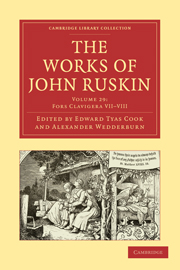Book contents
- Frontmatter
- Contents
- LIST OF ILLUSTRATIONS
- INTRODUCTION TO THIS VOLUME
- BIBLIOGRAPHICAL NOTE
- “FORS CLAVIGERA”: VOLUME VII. (1877): LETTERS 73–84
- “FORS CLAVIGERA”: VOLUME VIII. (1878–1884): LETTERS 85–96
- SYNOPSIS OF LETTERS 85–96
- LETTER 85 UNIQUE DOGMATISM (January, 1878)
- LETTER 86 LET US (ALL) EAT AND DRINK (February, 1878)
- LETTER 87 THE SNOW-MANGER (March, 1878)
- LETTER 88 THE CONVENTS OF ST. QUENTIN (March, 1880)
- LETTER 89 WHOSE FAULT IS IT? TO THE TRADES UNIONS OF ENGLAND (September, 1880)
- LETTER 90 LOST JEWELS (May, 1883)
- LETTER 91 DUST OF GOLD (September, 1883)
- LETTER 92 ASHESTIEL (November, 1883)
- LETTER 93 INVOCATION (Christmas, 1883)
- LETTER 94 RETROSPECT (March, 1884)
- LETTER 95 FORS INFANTIÆ (October, 1884)
- LETTER 96 (TERMINAL). ROSY VALE (Christmas, 1884)
- APPENDIX: ADDITIONAL PASSAGES FROM THE MANUSCRIPT OF, AND LETTERS RELATING TO, “FORS CLAVIGERA”
- INDEX
- Plate section
LETTER 95 - FORS INFANTIÆ (October, 1884)
Published online by Cambridge University Press: 07 September 2011
- Frontmatter
- Contents
- LIST OF ILLUSTRATIONS
- INTRODUCTION TO THIS VOLUME
- BIBLIOGRAPHICAL NOTE
- “FORS CLAVIGERA”: VOLUME VII. (1877): LETTERS 73–84
- “FORS CLAVIGERA”: VOLUME VIII. (1878–1884): LETTERS 85–96
- SYNOPSIS OF LETTERS 85–96
- LETTER 85 UNIQUE DOGMATISM (January, 1878)
- LETTER 86 LET US (ALL) EAT AND DRINK (February, 1878)
- LETTER 87 THE SNOW-MANGER (March, 1878)
- LETTER 88 THE CONVENTS OF ST. QUENTIN (March, 1880)
- LETTER 89 WHOSE FAULT IS IT? TO THE TRADES UNIONS OF ENGLAND (September, 1880)
- LETTER 90 LOST JEWELS (May, 1883)
- LETTER 91 DUST OF GOLD (September, 1883)
- LETTER 92 ASHESTIEL (November, 1883)
- LETTER 93 INVOCATION (Christmas, 1883)
- LETTER 94 RETROSPECT (March, 1884)
- LETTER 95 FORS INFANTIÆ (October, 1884)
- LETTER 96 (TERMINAL). ROSY VALE (Christmas, 1884)
- APPENDIX: ADDITIONAL PASSAGES FROM THE MANUSCRIPT OF, AND LETTERS RELATING TO, “FORS CLAVIGERA”
- INDEX
- Plate section
Summary
1. I do not well know whether it has more distressed, or encouraged me, to find how much is wanting, and how much to be corrected, in the hitherto accepted modes of school education for our youngest children. Here, for the last year or two, I have had the most favourable opportunities for watching and trying various experiments on the minds of country children, most thankfully recognizing their native power; and most sorrowfully the inefficiency of the means at the schoolmaster's disposal, for its occupation and development. For the strengthening of his hands, and that of our village teachers and dames in general, I have written these following notes at speed, for the brevity and slightness of which I must pray the reader's indulgence: he will find the substance of them has been long and deeply considered.
2. But first let me fulfil the pledge given in last number of Fors by a few final words about the Land Question—needless, if people would read my preceding letters with any care, but useful, as a general heading of them, for those who have not time to do so.
The plan of St. George's Guild is wholly based on the supposed possession of land by hereditary proprietors, inalienably; or if by societies, under certain laws of responsibility to the State.
In common language, and in vulgar thought, the possession of land is confused with “freedom.” But no man is so free as a beggar; and no man is more solemnly a servant to God, the king, and the laws of his country, than an honest land-holder.
- Type
- Chapter
- Information
- The Works of John Ruskin , pp. 493 - 516Publisher: Cambridge University PressPrint publication year: 2010First published in: 1907



